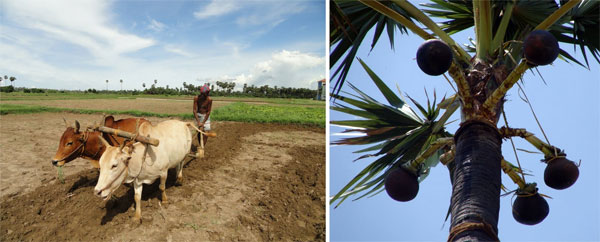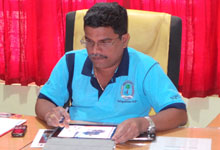 |
| The Iranamadu Irrigation Development Project (IIDP) |
| |
| |
 |
| |
| Benefit and Economic Analysis |
| |
At present, the Iranamadu scheme is working below capacity and in the Without Project situation that would continue to be the case. During maha, about 40% of the total 8,455 ha, or 3,380 ha would be cultivated with paddy, while in yala not more than 1691 ha would be under paddy.
In the With Project situation, during maha the total command area of 8,455 ha would be under paddy while during yala, 40% or 3,382 ha would be under diversified crops such as vegetables and about 1,700 ha would be under paddy at full development. In between the two main season, a sandwich crop would be grown on 1,214 ha. Agro-wells would serve an estimated 81 ha.
The private sector buyers would provide forward contracts for sustainably grown vegetables during the yala season. The maha crops would be sold in the market.
Sustainable techniques would be based on using as much as possible locally available biomass resources, such as compost, green manure, etc. It is estimated that input costs would be 20% lower than cropping with inorganic inputs. On the other hand, labour costs would be 25% higher for sustainable techniques. Crops produced under forward contracts would fetch a premium price of 15% over the bulk market price, due to the sustainable production under forward contracts as well as the improved quality of products.
|
| Benefits and beneficiaries |
| |
It is anticipated that the 7 000 households in the project area would benefit from improved irrigation infrastructure, crop diversification and ensured markets through forward contracts. A typical household cropping at present 0.8 ha of paddy during maha and 0.4ha of vegetables during yala would earn a net income of LKR 122 348 or LKR 2 913 per person per month, which is below the poverty line of LKR 3 318. In the With project situation, the typical household would farm 1.5 ha during maha with paddy and 0.8 ha with vegetables during yala. This would yield an income of LKR 257 000 or LKR 6 119 per person per month, 84% above the poverty line.
|
|
Other benefits
|
| |
Bulk Water Allocation The introduction of this participatory water management system has a proven positive impact on water efficiency and crop productivity. In this manner, in addition to improving farmer’s incomes, it is an appropriate measure to mitigate the impact of climate change.
Contract farming Direct purchases by Corporate buyers from farmer groups generates important benefits as demonstrated in Cargills’ collection centres in Jaffna. Proper transport in crates rather than in bags reduces post-harvest losses, which were 20%-30% of the harvest. In addition, the use of a properly calibrated weighing scale adds another 10% to farmer benefits.
Women The active participation of women in water management, crop production and marketing would provide a strong basis for their empowerment.
|
|
Sustainability
|
| |
Sustainability of project outputs and impact would be enhanced by the following features: From the beginning the degree of ownership of the irrigation infrastructure with farmers and local government is higher than in an “ordinary” scheme because infrastructure improvement was a condition for the use of part of the water from the reservoir for Jaffna drinking water supply.
The sense of ownership and sustainability would be further strengthened by participatory design. For the design of the rehabilitation of the distribution and field canals, participatory planning would be undertaken, after having operated the rehabilitated main canal for one season so that agreed design needs for these canals reflect actual felt needs rather than suggested solutions from outsiders.
The introduction of the innovative Bulk Water Allocation system has a proven effect on sustainability as it leads to fewer water conflicts, a reduced incidence of crop failures and an increased irrigation intensity. Also, farmers are actively involved in maintenance and there is a reduction in broken gates, broken pipe outlets and cases of silted canals.
The promotion of sustainable agriculture would protect farmers against the financial risk of possible changes in the generous subsidies for chemical inputs. At the same time, it would reduce the negative environmental impact of agriculture and this is essential as demonstrated by the case of Jaffna, where the groundwater is no longer usable for drinking purposes, requiring fresh water from the same Iranamadu reservoir. In order to ensure sustainable agriculture being supported and to minimize hazardous environmental damages to soil and water the usage of chemical inputs should be minimized.
|
|
| |
| Special Thank to... |
 |
Eng. N. Suthakaran
Deputy Director of Irrigation - Kilinochchi Range.
Project Director - Iranamadu Irrigation Development Project (IIDP)
|
 |
|
2013 Membership Dues - Don't Delay Payments All membership fees are due on the 1st of the year (January 1, 2013).
|
|
Current IESL by Laws allow a grace period of unprecedented 11 months (Nov 30, 2013). Through the new Membership Management System, members who have not paid have been alerted via email and for this year only, reminder letters have been posted. When you login to the new system you will see the invoice and the methods to pay.
If not paid by Nov 30, 2013, the system will automatically remove the defaulters (on Dec 1, 2013) membership and electronic directories will not show their names. Losing membership means losing the Charter for the corporate members. All those who lose will have to go through a reinstatement process as per the by laws which is similar to obtaining a new membership under prevailing rules!!. Next year new laws will come into place to further tighten the process and grace periods. So please pay your dues and be considerate towards policies and ethics of the IESL. Contact Mr. N.P.P.K Costa at the IESL Membership Department on 011-2698426, ext 220 or e-mail your message.
|
|
|
| |
|
|
|
11-12-13th October 2013 at the BMICH
|
|
Techno Sri Lanka is the only exhibition, which features widest range of engineering and technology products and services. It has the only powerful cost effective component of a well-planned marketing strategy. It provides thousands of high quality sales promotion opportunities in just 3 days.
|
|
|
Stall bookings are
NOW ON...
Contact Malith Kannangara on
+94 77 777 1005
|
|
| |
|